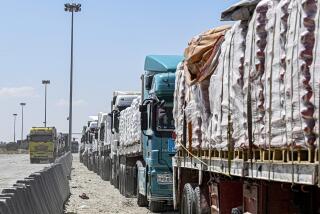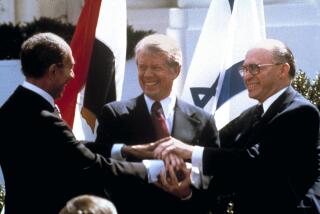Arabs Say Role Is Defensive Only, Reject Tough Talk
- Share via
RIYADH, Saudi Arabia — Arab troops in Saudi Arabia have no charter to join any offensive action to liberate Kuwait, and some Arab officials fear that tough talk in the United States and the Persian Gulf about ending Saddam Hussein’s reign in Iraq has hampered recent efforts to achieve a diplomatic resolution, a leading Arab diplomat said Monday.
“It’s a very dangerous situation. All the ingredients for explosion are there. Anybody, any incident, could start a war now, and if this is started, nobody knows how it will end,” said the official, who, along with other diplomats from Arab and Muslim countries, spoke on condition of anonymity.
The diplomats emphasized that the role of the Arab and Islamic multinational force now in Saudi Arabia is limited to defending that country’s territory. The senior official said that the only circumstance under which Arab troops would enter Kuwait would be as “a peacekeeping force, to replace the Iraqi forces, but not to fight them.”
Egypt, Morocco, Syria and Pakistan have all sent troops to join a 10,000-man permanent force from six Persian Gulf nations currently deployed near Saudi Arabia’s northern border with Kuwait and Iraq. Additional troops from Bangladesh are scheduled to arrive soon.
The Arabic forces report to Saudi military commanders, and one Arab diplomat helping oversee their operation said that any attempt to use them in connection with an American offensive against Iraq or Kuwait “would not be in conformity with their mission.”
“This is a very serious thing, and it would be against the agreement that is now in place,” he said, adding that the present terms of deployment are both political and pragmatic. “With the small amount of our force, it will serve a much more useful purpose if we are left to a defensive role in Saudi Arabia,” he said.
In Baghdad on Monday, the ruling party newspaper Thawra belittled a pledge by the Saudi defense minister that American forces would not mount an invasion of Kuwait from Saudi soil.
The Saudis could not control the Americans, the Baath Socialist Party organ charged, referring to Prince Sultan ibn Abdulaziz’s remark at a Saturday press conference. “It is the Pentagon and not the slave Sultan that decides the tasks of these forces,” it said.
Arab officials said efforts to achieve a diplomatic resolution are under way in Jordan, Libya and most recently, Algeria and other North African countries, but one official says they have been hampered by statements from U.S., Saudi and other officials declaring that Hussein must be removed from the helm in Iraq if there is to be any long-term stability in the region.
“This is very dangerous. We should abstain from threatening Saddam Hussein personally. If somebody is cornered from all circles, he will not compromise. He will fight. There must be an escape route, a way out,” the official observed.
“If he thinks that time is in his favor, the process of peaceful settlement could start to work, as long as he is convinced that the goal is not his neck. If he is convinced the Americans are here for that, then there is no formula for a peaceful solution. Then war is imminent.”
In Paris, the foreign ministers of five Arab League nations ended a two-day meeting by adopting a working document--its contents were kept secret--to be relayed to the leaders of Algeria, Libya, Mauritania, Morocco and Tunisia for further consideration.
The ministers’ closed-door discussions were believed to have included seeking an “Arab solution” to Iraq’s annexation of Kuwait. A source close to the discussions said Monday there was a “broad convergence of views.”
The five North African countries took opposing sides at the Arab League vote last month in Cairo on whether to support sending troops to the multinational peacekeeping force. Morocco voted in favor of sending troops, Libya against and Algeria and Mauritania abstained. Tunisia boycotted the meeting.
Most of the Arab diplomats who spoke in Saudi Arabia said they could not discuss the precise number of Arab and other Islamic troops currently deployed or on their way to the region. The overall present deployment is thought to be less than 20,000, counting the 10,000-strong Peninsula Shield force from the Persian Gulf countries. A U.S. official said the arrival of new Arab and Islamic troops has in some cases been delayed by Saudi Arabia’s temporary inability to accommodate them.
“Some of these Arab troops that arrived came with nothing but the clothes on their backs . . . and it’s a fantastic expense and strain on the Saudi logistics system to support those people,” the official said.
Saudi officials may in some cases be trying not to appear overly eager to welcome large numbers of new Arab troops in an attempt to hold down the cost they will eventually have to pay for them, he said.
“It’s not just that the Saudis want Arab troops but that the Arab troops think they’ll get paid. There’s a certain amount of bargaining going on . . . and at some point, even Saudi money is not infinite.”
Financial arrangements with most of the Arab and Islamic countries have not been disclosed, and in most cases have yet to be fully resolved.
Saudi Arabia’s King Fahd recently announced that the kingdom is donating $100 million to Egypt to help “lessen the suffering” of Egyptian workers in Iraq and Kuwait displaced by the crisis, and U.S. officials said this week that they plan to forgive Egypt’s $7.1 billion military debt, an action that had been under discussion even before the Aug. 2 invasion of Kuwait.
Egyptian soldiers have been arriving equipped with combat gear, rifles, ammunition, electrical generators and other equipment but have been dependent on the Saudis primarily for tents and catering. A recent tour of a Moroccan troop site showed that many of the troops had no tents and were outfitted in sandals.
Most Arab and Islamic diplomats vigorously denied that financial compensation or the promise of jobs for their nationals in Saudi Arabia played any role in the decision to send troops.
“We have a deep, deep emotional commitment to Saudi Arabia, the site of the two holy shrines (of Islam), that goes much deeper than just workers,” said one official.
More to Read
Sign up for Essential California
The most important California stories and recommendations in your inbox every morning.
You may occasionally receive promotional content from the Los Angeles Times.










